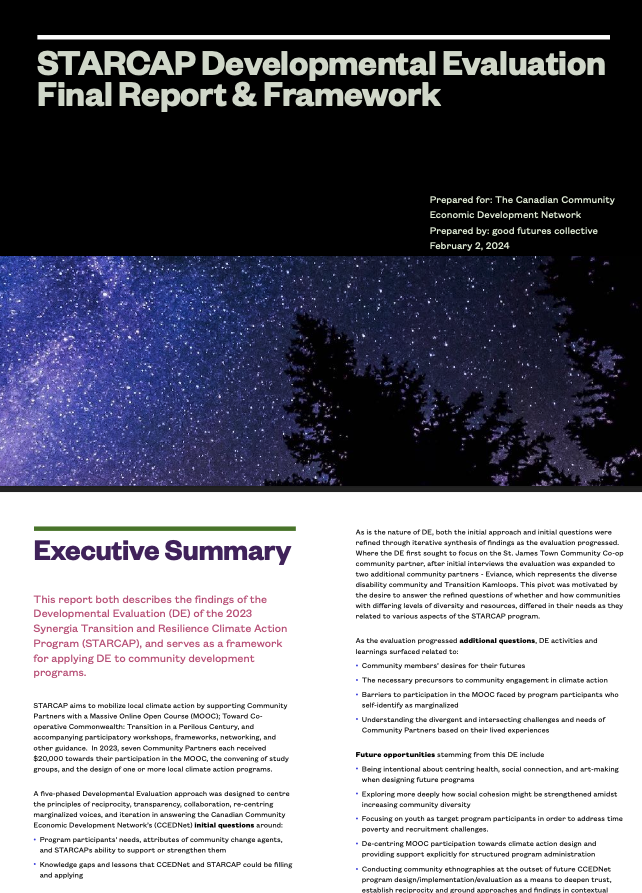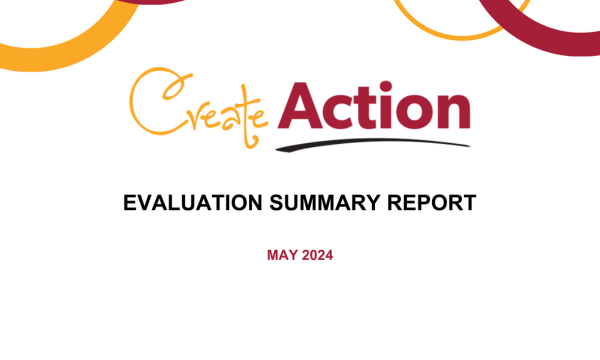This report both describes the findings of the Developmental Evaluation (DE) of the 2023 Synergia Transition and Resilience Climate Action Program (STARCAP), and serves as a framework for applying DE to community development programs.
STARCAP aims to mobilize local climate action by supporting Community Partners with a Massive Online Open Course (MOOC); Toward Co-operative Commonwealth: Transition in a Perilous Century, and accompanying participatory workshops, frameworks, networking, and other guidance. In 2023, seven Community Partners each received $20,000 towards their participation in the MOOC, the convening of study groups, and the design of one or more local climate action programs.
A five-phased Developmental Evaluation approach was designed to centre the principles of reciprocity, transparency, collaboration, re-centring marginalized voices, and iteration in answering the Canadian Community Economic Development Network’s (CCEDNet) initial questions around:
- Program participants’ needs, attributes of community change agents, and STARCAPs ability to support or strengthen them
- Knowledge gaps and lessons that CCEDNet and STARCAP could be filling and applying
Initial project phases included:
- Rapid Ethnography
- Community Partner and MOOC Participant Survey
- Co-Design Workshops with MOOC Study Circle
- Co-Design Workshops with Climate Action Group
- Collection, Synthesis and Sharing
As is the nature of DE, both the initial approach and initial questions were refined through iterative synthesis of findings as the evaluation progressed.
Where the DE first sought to focus on the St. James Town Community Co-op community partner, after initial interviews the evaluation was expanded to two additional community partners – Eviance, which represents the diverse disability community and Transition Kamloops. This pivot was motivated by the desire to answer the refined questions of whether and how communities with differing levels of diversity and resources, differed in their needs as they related to various aspects of the STARCAP program.
As the evaluation progressed additional questions, DE activities and learnings surfaced related to:
- Community members’ desires for their futures
- The necessary precursors to community engagement in climate action
- Barriers to participation in the MOOC faced by program participants who self-identify as marginalized
- Understanding the divergent and intersecting challenges and needs of Community Partners based on their lived experiences
Future opportunities stemming from this DE include
- Being intentional about centring health, social connection, and art-making when designing future programs
- Exploring more deeply how social cohesion might be strengthened amidst increasing community diversity
- Focusing on youth as target program participants in order to address time poverty and recruitment challenges.
- De-centring MOOC participation towards climate action design and providing support explicitly for structured program administration
- Conducting community ethnographies at the outset of future CCEDNet program design/implementation/evaluation as a means to deepen trust, establish reciprocity and ground approaches and findings in contextual nuance.
Finally with respect to providing generalizable guidance on applying DE to community development, this report proposes a framework based on the Double Diamond approach to design, which can be viewed as scaffolding on which to build various DE activities. Activities undertaken for this evaluation are described in detail to illustrate how this approach might be applied.
Table of Contents
- Executive Summary
- Table of Contents
- About Developmental Evaluation
- Developmental Evaluation as Program Design
- A Double Diamond Framework for the STARCAP Developmental Evaluation
- Designing the Right Thing
- Evaluation Goals
- Discover
- Unstructured Research Findings
- Define
- Designing the Thing Right
- Develop
- Deliver
- Answers
- Future Programs
- Appendix A Project Proposal
- Appendix B Phase 1 Report
- Appendix C MOOC Survey & Results
- Appendix D Workshop Decks (1, 2 & 3)
- Appendix E Workshop Post Survey Results
- Appendix F Follow-up Interviews Guide & Transcripts






